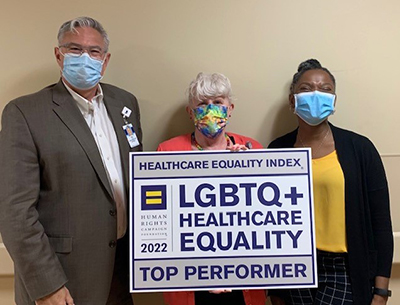
Phoenixville Hospital has received an evaluation of 90 out of 100 and the designation of "LGBTQ+ Healthcare Equality Top Performer" in the Human Rights Campaign Foundation's 15th anniversary edition of the Healthcare Equality Index (HEI), the nation's foremost benchmarking survey of healthcare facilities on policies and practices dedicated to the equitable treatment and inclusion of their LGBTQ+ patients, visitors, and employees. A record 906 healthcare facilities actively participated in the 2022 HEI survey and 251 of those earned an "LGBTQ+ Healthcare Equality Top Performer" designation.
"Phoenixville Hospital is honored and values this designation," says Rich Newell, President and Chief Executive Officer, Phoenixville and Pottstown Hospitals. "Being rated as a 'Top Performer' reflects the hard work our staff has put into meeting the needs of our LGBTQ+ staff and patients. We are committed to provide high-quality care to the LGBTQ+ community and making all of our patients feel valued and safe when in our care."
"Every person deserves to have access to quality healthcare, be respected and heard by their doctor, and feel safe in the facility where they are receiving care. But LGBTQ+ people are often subject to discrimination in all spaces, including healthcare facilities, which leads to members of the community avoiding care and anticipating our voices will not be respected in an incredibly vulnerable environment," said Tari Hanneman, Director of Health & Aging at The Human Rights Campaign. "The Healthcare Equality Index, at its core, strives to ensure LGBTQ+ people are protected and affirmed by their healthcare providers and feel safe seeking services. Our HEI active participants are truly pioneering the healthcare industry by implementing robust, comprehensive LGBTQ+ inclusive policies that hopefully, because of their work, will become standard practice."
The HEI evaluates and scores healthcare facilities on detailed criteria falling under four central pillars:
- Foundational Policies and Training in LGBTQ+ Patient-Centered Care
- LGBTQ+ Patient Services and Support
- Employee Benefits and Policies
- Patient and Community Engagement
In the 2022 report, an impressive 496 facilities earned HRC's "LGBTQ+ Healthcare Equality Leader" designation, receiving the maximum score in each section and earning an overall score of 100. Another 251 facilities earned the "Top Performer" designation with scores between 80 to 95 points and at least partial credit in each section. With 82% of participating facilities scoring 80 points or more, healthcare facilities are demonstrating concretely that they are going beyond the basics when it comes to adopting policies and practices in LGBTQ+ care.
The remarkable progress reflected in the 2020 HEI includes:
- 93% of participants met the HEI's training requirements, completing more than 200,000 hours of staff training in LGBTQ+ patient-centered care.
- 82% of participating facilities earned either the Leader or Top Performer.
- 99% of HEI participants documented that they include both "sexual orientation" and "gender identity" in their patient non-discrimination policy.
- 99% of HEI participants documented that they include both "sexual orientation" and "gender identity" in their employment nondiscrimination policy.
- 81% of HEI participants offer transgender-inclusive healthcare benefits to their employees, up from 75% in 2019, which was the first year that it was required to receive Leader status.
In addition to active survey participants, the HRC Foundation proactively researched the key policies for LGBTQ+ inclusion at over 1,300 non-participating hospitals. Unfortunately, these research hospitals were much less likely to have LGBTQ+ nondiscrimination policies in place, which is a stark contrast to the near-perfect adoption by active participants. Among the researched hospitals in which we were able to find or obtain enumerated patient non-discrimination policies, only 70% have policies that include both sexual orientation and gender identity compared to 99% of HEI participants.
The Diversity & Inclusion Council at Phoenixville Hospital is pictured above (left to right): Rich Newell, MPT, DPT, CEO, Phoenixville and Pottstown Hospitals; Tracy Duffy, RN, BSN, Director of Professional Development; and Carlene Allana Denis, MD, FACOG, President, Medical Executive Committee.
About Phoenixville Hospital
Located in Phoenixville, Pa., and a member of Tower Health, Phoenixville Hospital is a 144-bed facility that provides comprehensive medical services through emergency room visits, inpatient admissions, outpatient procedures and community outreach programs. Phoenixville Hospital's services include an award-winning cardiovascular program, a fully accredited cancer center, an NAPBC-accredited breast health center, an acute inpatient rehabilitation center, and a large robotic surgery center. Phoenixville Hospital is accredited by The Joint Commission and has been recognized for its quality outcomes and clinical expertise across services lines that include joint replacement surgery, advanced heart failure care, and the designation as a Primary Stroke Center. For more information, visit towerhealth.org.
About Human Rights Campaign Foundation
The Human Rights Campaign Foundation is the educational arm of the Human Rights Campaign (HRC), America's largest civil rights organization working to achieve equality for lesbian, gay, bisexual, transgender and queer (LGBTQ+) people. Through its programs, the HRC Foundation seeks to make transformational change in the everyday lives of LGBTQ+ people, shedding light on inequity and deepening the public's understanding of LGBTQ+ issues, with a clear focus on advancing transgender and racial justice. Its work has transformed the landscape for more than 15 million workers, 11 million students, 1 million clients in the adoption and foster care system and so much more. The HRC Foundation provides direct consultation and technical assistance to institutions and communities, driving the advancement of inclusive policies and practices; it builds the capacity of future leaders and allies through fellowship and training programs; and, with the firm belief that we are stronger working together, it forges partnerships with advocates in the U.S. and around the globe to increase our impact and shape the future of our work.
